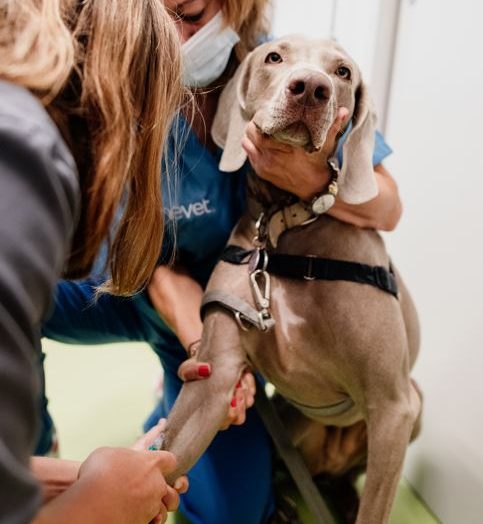Parasite treatments
Parasites can affect your pet in a variety of ways, ranging from simple irritation to causing life-threatening conditions if left untreated.It is fairly common for a dog or cat to become infected with an internal or external parasite at some point in their lifetime. Our veterinarians at Onevet Figueira da Foz Veterinary Clinic in can help prevent, accurately diagnose and safely treat parasites and other health problems that not only affect your dog or cat, but also the safety of you and your family.
Parasites that we treat:
- Heartworms
- Fleas
- Ticks
- Ear Mites
- Coccidia
- Giardia
- Mange Mites
- Toxoplasmosis
- Hookworms
- Roundworms
- Tapeworms
- Whipworms

Year-round prevention

Parasites can infect your pet any time of the year. External parasites, such as fleas and ticks, may be less prevalent outside during certain seasons; however, they often survive in houses during the winter months, creating an uninterrupted life cycle.
Other internal parasites, such as worms, may affect your pet all year long.
These are some of the measures you can take to prevent it:
- Use a preventative flea and/or tick treatment year-round.
- Only feed pets cooked or prepared food (not raw meat).
- Minimize exposure to high-traffic pet areas.
- Clean up pet feces regularly.
- Visit your veterinarian for annual testing and physical examination.
- Administer worming medications as recommended by your veterinarian.
- Ask your veterinarian about parasite infection risks and effective year-round preventative control measures administered monthly.
Common questions about pets and parasites
Do fleas and ticks on my pet present a health risk to my family?
Yes. Fleas and ticks can carry and either directly or indirectly transmit several potential illnesses to humans. For example, rickettsiosis (infection with Rickettsia) can be transmitted directly by ticks. Bartonellosis (infection with Bartonella) can be transmitted between cats by fleas and then may spread to people. Also, fleas serve as an intermediate host for tapeworms, which can infect both your pet and humans.
What kind of internal parasites or worms can infect my cat or dog?
There are a number of intestinal worms that can infect dogs and cats, and they vary according to the species. In general, these include roundworms, hookworms, whipworms and tapeworms, and they are very prolific. In fact, one worm can produce more than 100,000 eggs per day, which can then be passed through your pet’s feces and spread throughout the area your pet roams.
Are heartworms a parasite I should be concerned about for my pet?
Yes. Heartworms can be a very serious problem for both dogs and cats, especially those in mosquito-infested areas, as mosquitoes are a vector and an intermediate host for the pest. Heartworms can kill or seriously debilitate pets that are infected with them. That’s because heartworms live in the bloodstream, lungs and heart of infected pets. Your veterinarian can do a blood test to determine if your pet has heartworm disease. A year-round preventive program is most effective to keep pets free of heartworms.

